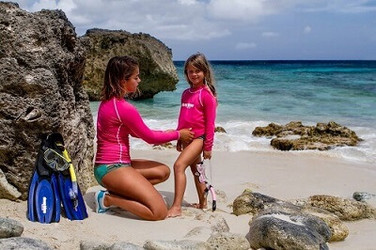Why You Should Care About What's In Your Sunscreen
Posted by Lauren Dollinger on May 30th 2018
Sunscreen: Without it, most of us feel the harmful and damaging effects of UV Rays in the form of a sunburn. With it, we damage our coral reefs. How do you choose between a painful sunburn and protecting the reef life? By opting for reef-safe sunscreens and using rashguards, you can combat the UV Rays while enjoying the sunshine.
More than 3,500 sunscreen products contain oxybenzone and octinoxate and are approved by the FDA due to their success in combating skin cancer. The unfortunate reality is that while these chemicals are successful at protecting your skin, they have an exceptionally negative impact for the environment. According to the Maui Nie Marine Resource Council, these chemicals contribute to coral bleaching by preventing the coral from absorbing nutrients. Oxybenzone and octinoxate are also known to stunt the growth of baby corals. This not only harms the living coral reefs, but also the immense, vital ecosystems that rely on the coral reefs to survive.
On May 1st, Hawaii started a trend by unanimously passing a vote to ban these coral killing chemicals in sunscreen, and the island of Bonaire is following suit. While the legislation is not set to take place until 2021, some tour operators have begun enforcing their own bans on sunscreens. Mexico’s Riviera Maya has taken steps to strongly discourage visitors from using these sunscreens in their popular parks, as well as in surrounding regions; however they have not passed any legislation regulating this. If you are planning a holiday to Hawaii, Mexico, Bonaire, or any other tropical destination, we recommend checking in first to see if there are any regulations in place on sunscreen usage.
If popular brands of sunscreen are out the window, then what can you do to protect your skin? Using mineral based sunscreens, such as TropicSport, Raw Elements, or using rashguards that offer UV protection will keep your skin and our precious coral reefs safe. The ingredient to look for in your sunscreens is zinc oxide which is proven to be effective at scattering, absorbing, and reflecting UV radiation, therefore protecting your skin.
What are your thoughts on these bans? Leave a comment below.
Sources:
https://www.nytimes.com/2018/05/03/travel/hawaii-sunscreen-ban.html
http://www.bbc.com/news/world-us-canada-43993407
https://www.livescience.com/62598-bonaire-island-bans-sunscreen.html
https://www.badgerbalm.com/s-33-zinc-oxide-nanoparticles-clear-zinc-sunscreens.aspx

